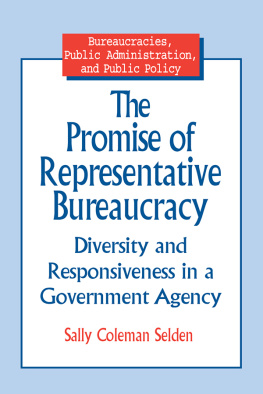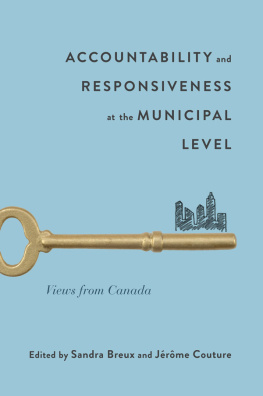The
Promise of
Representative
Bureaucracy
Bureaucracies, Public Administration,
and Public Policy
Kenneth J. Meier
Series Editor
THE STATE OF PUBLIC BUREAUCRACY
Larry B. Hill, Editor
THE POLITICS OF DISSATISFACTION
Citizens, Services, and Urban Institutions
W. E. Lyons, David Lowery, and Ruth Hoogland DeHoog
THE DYNAMICS OF CONFLICT
BETWEEN BUREAUCRATS AND LEGISLATORS
Cathy Marie Johnson
THE POLITICS OF TELECOMMUNICATIONS REGULATION
The States and the Divestiture of AT&T
Jeffrey E. Cohen
WOMEN AND MEN OF THE STATES
Public Administrators at the State Level
Mary E. Guy, Editor
ETHICS AND PUBLIC ADMINISTRATION
H. George Frederickson, Editor
ENVIRONMENTAL PROTECTION AT THE STATE LEVEL
Politics and Progress in Controlling Pollution
Evan J, Ringquist
THE POLITICS OF SIN
Drugs, Alcohol, and Public Policy
Kenneth J. Meier
ELECTORAL STRUCTURE AND URBAN POLICY
The Impact on Mexican American Communities
J. L. Polinard, Robert D. Wrinkle, Tomas Longoria, and Norman E. Binder
CONTROLLING THE BUREAUCRACY
Institutional Constraints in Theory and Practice
William F. West
ENFORCING THE LAW
The Case of the Clean Water Acts
Susan Hunter and Richard W. Waterman
EXECUTIVE GOVERNANCE
Presidential Administrations and Policy Change in the Federal Bureaucracy
Cornell G. Hooton
THE PROMISE OF REPRESENTATIVE BUREAUCRACY
Diversity and Responsiveness in a Government Agency
Sally Coleman Selden
The
Promise of
Representative
Bureaucracy
Diversity and
Responsiveness in a
Government Agency
Sally Coleman Selden
First published 1997 by M.E. Sharpe
Published 2015 by Routledge
2 Park Square, Milton Park, Abingdon, Oxon OX14 4RN
711 Third Avenue, New York, NY 10017, USA
Routledge is an imprint of the Taylor & Francis Group, an informa business
Copyright 1997 Taylor & Francis. All rights reserved.
No part of this book may be reprinted or reproduced or utilised in any form or by any electronic, mechanical, or other means, now known or hereafter invented, including photocopying and recording, or in any information storage or retrieval system, without permission in writing from the publishers.
Notices
No responsibility is assumed by the publisher for any injury and/or damage to persons or property as a matter of products liability, negligence or otherwise, or from any use of operation of any methods, products, instructions or ideas contained in the material herein.
Practitioners and researchers must always rely on their own experience and knowledge in evaluating and using any information, methods, compounds, or experiments described herein. In using such information or methods they should be mindful of their own safety and the safety of others, including parties for whom they have a professional responsibility.
Product or corporate names may be trademarks or registered trademarks, and are used only for identification and explanation without intent to infringe.
Library of Congress Cataloging-in-Publication Data
Selden, Sally Coleman, 1966
The promise of representative bureaucracy: diversity and responsiveness in a government agency / by Sally Coleman Selden.
p. cm.(Bureaucracies, public administration, and public policy)
Includes bibliographical references and index.
ISBN 0-7656-0055-2 (cloth: alk. paper)ISBN 0-7656-0056-0 (pbk.: alk. paper)
1. United States. Farmers Home Administration. 2. Bureaucracy.
3. Democracy. I. Title. II. Series.
HG2051.U5C558 1997
353.5527360973dc21 97-12695
CIP
ISBN 13: 9780765600561 (pbk)
ISBN 13: 9780765600554 (hbk)
To my family
The M.E. Sharpe series in Bureaucracy, Public Policy, and Public Administration is designed as a forum for the best work on bureaucracy and its role in public policy and governance. Although the series is open with regard to approach, methods, and perspectives, especially sought are three types of research. First, the series hopes to attract empirical studies of bureaucracy. Public administration has long been viewed as a theoretical and methodological backwater of political science. This view persists despite a recent flurry of research. The series seeks to place public administration at the forefront of empirical analysis within political science. Second, the series is interested in conceptual work that attempts to clarify theoretical issues, set an agenda for research, or provide a focus for professional debates. Third, the series seeks manuscripts that challenge the conventional wisdom about how bureaucracies influence public policy or the role of public administration in governance.
I am very pleased to include in the M.E. Sharpe series Sally Coleman Seldens The Promise of Representative Bureaucracy. A past winner of the Leonard White award for the best dissertation in public administration, The Promise of Representative Bureaucracy shows how first-class research in public administration should be done. It is a rigorous empirical study that breaks new ground theoretically. At the same time it has practical implications for the day-to-day operation of bureaucracies. The Promise of Representative Bureaucracy should be read by every graduate student in public administration as a blueprint for the process of research in public administration.
Many scholars have proposed that representative bureaucracy is a way to reconcile the need for bureaucracy with the demands of a democratic state. Representative bureaucracy is a theory that suggests bureaucratic values are a function of the social origins of the bureaucrats. If, the theory suggests, bureaucracies can be made broadly representative of the people, then the values held by bureaucrats will correspond with those of the general public. Political controls are less necessary in such a situation because as bureaucrats maximize their own values, they produce policies that will benefit the broader public.
Professor Seldens contribution is to link representative bureaucracy back to the broader demands of the organization. Many contend that representative bureaucracy will rarely work because organizations socialize their employees to advocate the interests of the organization. Professor Selden examines the roles that bureaucrats play within an organization. Some bureaucrats, she finds, accept the role of representing minority interests in the organization and resist the other socialization pressures in the organization. While many such bureaucrats are minorities, many are not. A persons perceived role in the organization, as a result, becomes a more powerful predictor of behavior than race or minority status.
In her study of the Federal Home Administration, Professor Selden finds that, because they have more individuals who accept the role of minority representative, regional offices with more minority employees are more likely to grant loans to minority clientele. Hers joins a small number of other studies to find that bureaucratic representation makes a significant difference in the lives of citizens. This finding moves debates concerning affirmative action beyond the question of access to jobs or patronage to broader questions of the responsiveness of bureaucracy to the entire population.











